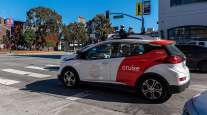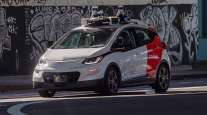Bloomberg News
Cruise Grounds Robotaxi Fleet After California Suspension

[Stay on top of transportation news: Get TTNews in your inbox.]
General Motors Co.’s driverless taxi unit Cruise has grounded its entire fleet just days after its license was suspended by California, in a major setback for the company that has been laying the groundwork to expand to multiple U.S. cities and Japan.
California’s Department of Motor Vehicles on Oct. 24 suspended Cruise from operating driverless cars in the state and accused the company of withholding crucial video of an accident involving a pedestrian in San Francisco.
“The most important thing for us right now is to take steps to rebuild public trust,” Cruise said in a post on X, the social media site formerly known as Twitter. “In that spirit, we have decided to proactively pause driverless operations across all of our fleets.”
Federal regulators with the National Highway Traffic Safety Administration have also opened an investigation into Cruise. Cruise has been expanding to other cities including Austin and Phoenix.
(1/3) The most important thing for us right now is to take steps to rebuild public trust. Part of this involves taking a hard look inwards and at how we do work at Cruise, even if it means doing things that are uncomfortable or difficult. — cruise (@Cruise) October 27, 2023
In August, California’s Public Utilities Commission voted 3-1 to allow Cruise and Alphabet Inc.’s Waymo to charge riders fares for driverless rides in the dense and notoriously hilly city. But the expanded operations by Cruise were quickly marred by several high-profile incidents, including one where a person landed in front of a Cruise taxi after being hit by another car.
The robotaxi braked hard but ran over the person. The vehicle then tried to pull over as a safety maneuver but continued driving for 20 feet at a speed of up to 7 mph with the pedestrian still under the car, the DMV said. That may have caused further injury, the agency said.
The DMV says Cruise didn’t disclose video of the attempted pullover maneuver when it shared footage of the accident with agency officials on Oct. 3. The agency said it learned of the vehicle’s subsequent movement from NHTSA and then requested that Cruise provide the additional footage. The company’s omission hinders the agency’s ability to evaluate the safety of its autonomous vehicles, the DMV said.

Who's Who in the Autonomous Space
►Overview of Self-Driving Truck Development
Company Sketches
Click the links to jump to profiles of autonomous companies.
Aurora | Waymo | TuSimple | Gatik | Locomation | Torc Robotics | Waabi | Einride | Plus | Embark | Kodiak Robotics | Robotic Research | Outrider | Pronto
Cruise has disputed the DMV’s characterization and said it showed the agency the entire video.
The company had 400 cars operating in San Francisco and a further 200 in Austin, Houston and Phoenix. Cruise has ceased all autonomous operations but will continue running cars with safety drivers.
In addition, Cruise is doing developmental work in 11 other cities to eventually offer services and will continue that work, said a spokesman.
How Cruise handles its current crisis will have implications for all autonomous operators, said Reilly Brennan, general partner at Trucks Venture Capital, which invests in transportation technology. So far, California regulators are focused on Cruise, but added incidents will be problematic for other companies like Alphabet Inc.’s Waymo.
“This is a rubicon moment for Cruise, and as a result every AV entity,” Brennan said. “The paradox of this moment in AVs is that all company successes are theirs individually, but all failures are shared as a group. Whether right or wrong.”
California’s DMV didn’t respond to inquiries after regular business hours.
Want more news? Listen to today's daily briefing above or go here for more info
Cruise is also burning through cash, having gone through $1.4 billion this year. On GM’s earnings call Oct. 24, CEO Mary Barra said the company believes in AV technology and plans to deploy it with Honda Motor Co. in Tokyo in 2026.
A spokesperson for Honda said Cruise’s U.S. suspension has no effect on its plans for now.
“We know from the data that Cruise AVs are involved in far fewer collisions than human drivers,” Barra told analysts on the call.




